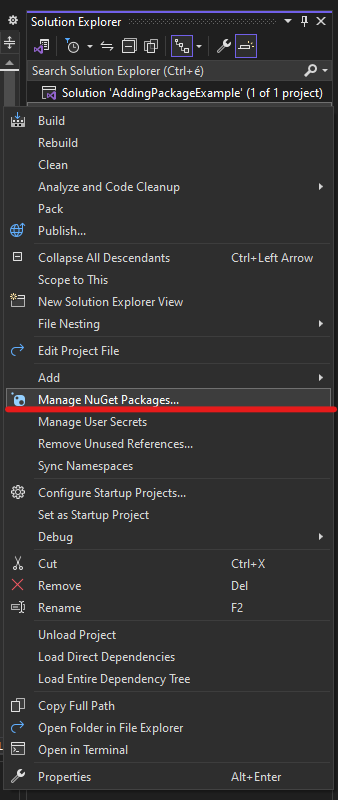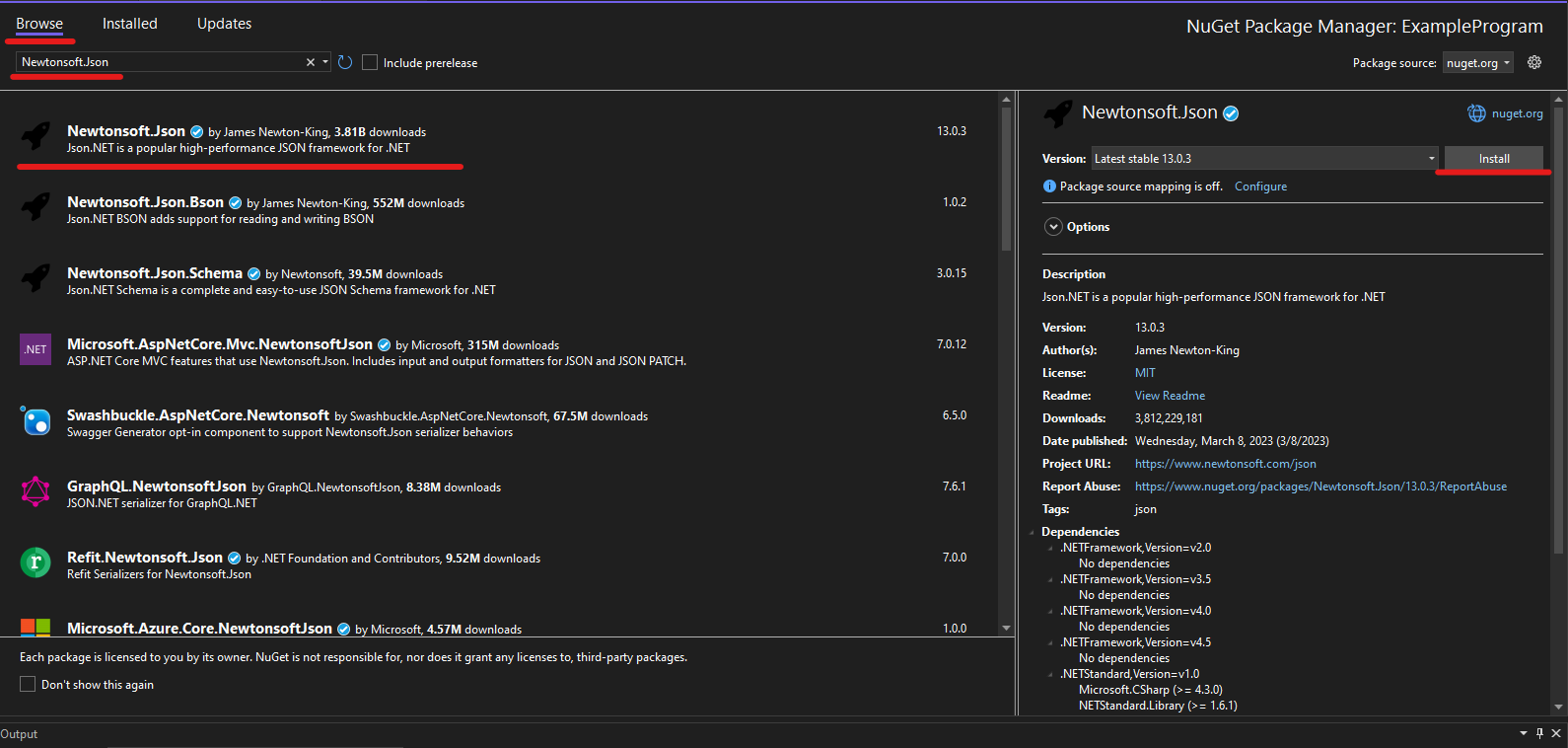.NET Software Development Kit for integrating your HARBARD API compatible traffic monitoring device into your application.
Provides high level classes and functions indentical to the ones defined in Harbard API documentation.
- Einar-5 from v2.3.0
- Einar Gen 2 from v1.3.0
- Carmen Box/Nano from v1.4.0
- Enforce Box/Nano from v1.4.0
- Lynet Gen 2 from v1.0.0
In order to use API functions one must aquire a device session through one of the following classes depending on the level of abstraction required.
Note
The available methods are grouped into categories. Each category has a set of methods that can perform an action on the device or query the device for information.
Important
Requirements: NewtonSoft.Json
Provides high level API functions divided into categories. Each category is represented by a class member.
- Function names in each category are indentical to the ones defined in Harbard API documentation.
- Every function has a synchronous and asynchronous version.
- For each request and response structure related to an API method there is a matching C# class.
| Members | Description |
|---|---|
| SystemSession | Methods that allow configuring general aspects of the device like name, time or user accounts |
| AnalyticsSession | Methods for managing analytics engines, detectors and querying events |
| StorageSession | Methods for managing the on-board storage and querying stored data |
Providies low level functions to execute API methods
- Request and response structures are represented by NewtonSoft JSON objects (JObjects).
| Functions | Description |
|---|---|
| executeCommand(category, method, data?) | Executes an API method in a given category data is expected JObject (for further details see Harbard API documentation) |
| executeCommandAsync(category, method, callback, data?) | Asynchronous version of executeCommand that expects a callback |
| login() | Provides SessionID for API calls in case of a successful login Must be called before calling executeCommand |
| logout() | Releases previously acquired SessionID |
Aquire API session - Creating ApiSession with using statement takes care of login and logout
string address = "<ip>|<hostname>";
string username = "<device user>";
string password = "<device password>";
using(var apiSession = new ApiSession(address, username, password, /*port = 80, secureConnection = false*/))
{
if(apiSession) //login succeeded, apiSession is valid, contains apiSession.Session.Id
{
//your code here
}
else if(apiSession.Session.LastError != null) //LastError check is for avoiding compile warning only
{
//throw session.Session.LastError; OR
Console.Error.WriteLine(apiSession.Session.LastError.exceptionClass + " : " + apiSession.Session.LastError.errorMessage);
}
}Devices support multiple modes for acquiring emitted events.
Event fetching can either be live or from device strorage.
Live event stream
- Contains event image and metadata
- HTTP multipart stream
- LiveEventStream class implements recieving events from live event stream.
using(var apiSession = new ApiSession(address, username, password, /*port = 80, secureConnection = false*/))
{
if(apiSession) //login succeeded, apiSession is valid, contains apiSession.Session.Id
{
using(LiveEventStream liveEventStream = new LiveEventStream(apiSession.Session, event_callback))
{
liveEventStream.Run(); //blocks until connection is closed or returning false from event callback
}
}
else if(apiSession.Session.LastError != null) //LastError check is for avoiding compile warning only
{
//throw session.Session.LastError; OR
Console.Error.WriteLine(apiSession.Session.LastError.exceptionClass + " : " + apiSession.Session.LastError.errorMessage);
}
}Creating an event callback:
Note
Running code in event_callback will not affect the flow of event stream
private static bool event_callback(EventPackage event_package)
{
//If no events occure for a certain time a keepalive message will be sent by the device
if (event_package.isKeepAlive)
{
//your code here
//It is a good place to decide to continue reading events or to stop.
return true; //we decided to continue reading events
}
//Check for event image
if ((event_package.image != null) && (event_package.image.data != null))
{
//your code here
//event_package.image.data contains the event image binary
//event_package.image.width, event_package.image.height holds the event image's dimensions
//event_package.image.format holds the event image format
File.WriteAllBytes("./" + event_package.image.imageId + "." + event_package.image.format, event_package.image.data);//we chose to save image to disc
}
//Check for event metadata
if (event_package.eventInfo != null)
{
//We chose to print detector name : event ID : event time
Console.WriteLine($"{event_package.eventInfo._Config._DisplayName} : {event_package.eventInfo._EventID} : {event_package.eventInfo._EventTime}");
//your code here
//event_package.eventInfo is an object of Event class that provides several event specializations
//<EventType>? current_event = event_package.eventInfo.as<EventType>();
//we chose to check if it is an ANPR type event and write some info to console
EventANPR? anprEvent = event_package.eventInfo.asEventANPR();
if(anprEvent != null) //this is an ANPR event
{
if(anprEvent._EventInfo != null) //check is for avoiding compile warning only
{
var event_info = anprEvent._EventInfo;
Console.WriteLine($"LicensePlate: {event_info._Text}, Country: {event_info._Country}");
}
}
else
{
//check for other event types
}
}
return true;
}Start LiveEventStream asynchronously
Warning
Avoid using statements in case of running LiveEventStream asynchronously
ApiSession apiSession = new ApiSession(address, username, password, /*port = 80, secureConnection = false*/);
LiveEventStream? liveEventStream = null;
if(apiSession)
{
LiveEventStream liveEventStream = new LiveEventStream(apiSession.Session, event_callback);
liveEventStream.RunAsync((Exception e)=>
{
Console.WriteLine("Thread exception: {0}", e);
});
}
//... code ...
apiSession.Dispose(); // apiSession.Dispose must be called explicitlyLive event query
- Contains metadata only
- Based on polling events, makes multiple HTTP requests
- HTTPS support
- LiveEventQuery class implements polling events from live event query.
using(var apiSession = new Harbard.ApiSession(ip, username, password, port, false))
{
if(apiSession)
{
LiveEventQuery liveEventQuery = new LiveEventQuery(apiSession.Analytics, anprCallback);
liveEventQuery.Run(); //blocks until session/connection is closed or returning false from event callback
}
else
{
if(session.Session.LastError != null)
{ Console.Error.WriteLine(apiSession.Session.LastError.exceptionClass + " : " + apiSession.Session.LastError.errorMessage); }
}
}Creating an event callback:
private static bool event_callback(BufferedEvents? buffered_events, ApiException? api_error)
{
if (api_error != null)
{
//some error occured
Console.WriteLine(api_error.ToString());
return false;//stop receiving
}
else if (buffered_events != null)
{
//Printing number of events discarded since the start of buffering
//See in Harbard API documentation
Console.WriteLine($"Discarded events count: {buffered_events._DiscardedEvents}");
foreach (var analyticsEvent in buffered_events._EventList)
{
//We chose to print detector name : event ID : event time
Console.WriteLine($"{analyticsEvent._Config._DisplayName} : {analyticsEvent._EventID} : {analyticsEvent._EventTime}");
//analyticsEvent is an object of Event class that provides several event specializations
//<EventType>? current_event = event_package.eventInfo.as<EventType>();
//we chose to check if it is an ANPR type event and write some info to console
EventANPR? anprEvent = analyticsEvent.asEventANPR();
if (anprEvent != null) //this is an ANPR event
{
if (anprEvent._EventInfo != null) //check is for avoiding compile warning only
{
var event_info = anprEvent._EventInfo;
Console.WriteLine($"LicensePlate: {event_info._Text}, Country: {event_info._Country}");
}
}
else
{
//check for other event types
}
}
}
return true;
}Stored event query
- Contains event image, event video and metadata
- Requires storage device
- StoredEventQuery class implements recieving a list of events from stored event query
using (var apiSession = new ApiSession(address, username, password, /*port = 80*/))
{
if (apiSession) //login succeeded, apiSession is valid, contains apiSession.Session.Id
{
StoredEventQuery storedEventQuery = new StoredEventQuery(apiSession.Storage, startTime, endTime);
StorageEvents storageEvents = storedEventQuery.Run(); //runs once and returns with a list of events recorded in the given timeframe
if(storageEvents._EventList != null) //check is for avoiding compile warning only
{
foreach (var storageEvent in storageEvents._EventList)
{
//We chose to print detector name : event ID : event time
Console.WriteLine($"{storageEvent._Config._DisplayName} : {storageEvent._EventID} : {storageEvent._EventTime}");
//Fetching relevant EventImage by calling the GetEventImage function:
var image = storedEventQuery.GetEventImage(storageEvent);
//your code here
//we chose to save image to disk:
if ((image != null) && (image.data != null)) //check is for avoiding compile warning only
{ File.WriteAllBytes("./" + storageEvent._EventID + "." + image.format, image.data); }
//Fetching relevant EventVideo by calling the GetEventVideo function:
var video = storedEventQuery.GetEventVideo(storageEvent);
//your code here
//we chose to save video to disk
if ((video != null) && (video.data != null)) //check is for avoiding compile warning only
{ File.WriteAllBytes("./" + storageEvent._EventID + "." + video.format, video.data); }
}
}
}
else if (apiSession.Session.LastError != null) //LastError check is for avoiding compile warning only
{
//throw session.Session.LastError; OR
Console.Error.WriteLine(apiSession.Session.LastError.exceptionClass + " : " + apiSession.Session.LastError.errorMessage);
}
}Important
You need to compile the HarbardSDK before using it
- Open HarbardSDK.csproj file and set configuration to Release. Then click on Build

- Then click on Build Solution
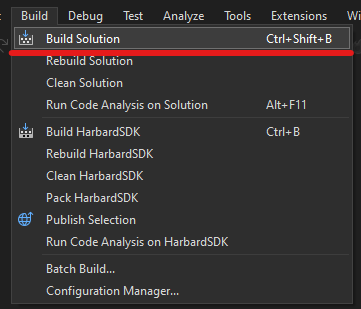
This will create a dll file in the bin/Release by default.
You can use this dll file to Add HarbardSDK to your solution.
Before being able to run the example programs you need to compile them with the same method used when Compiling the SDK.
- Open your chosen example program's .csproj file and set configuration to Release. Then click on Build

- Then click on Build Solution

Now you are ready to run the example programs.
Follow this quick guide to learn how to add HarbadSDK to your solution:
Important
Adding HarbardSDK to a solution is only possible if it the SDK has already been compiled.
See Compiling SDK for more
- In VisualStudio 2022, go to the Solution Explorer and right-click on your csproject file
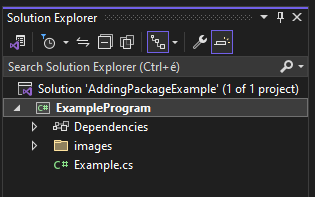
- Then go to
Add->Project Reference
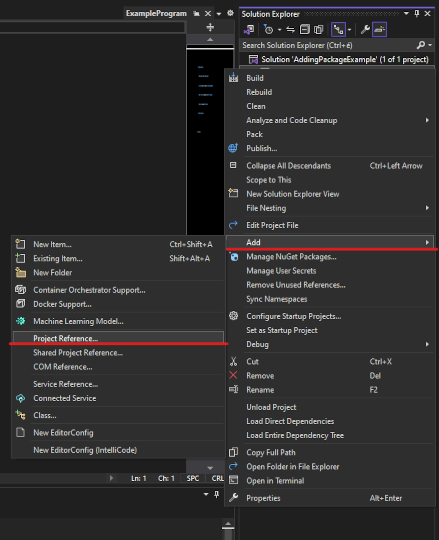
- If you do not see the required dll file in the Reference Manager click on
Browse...
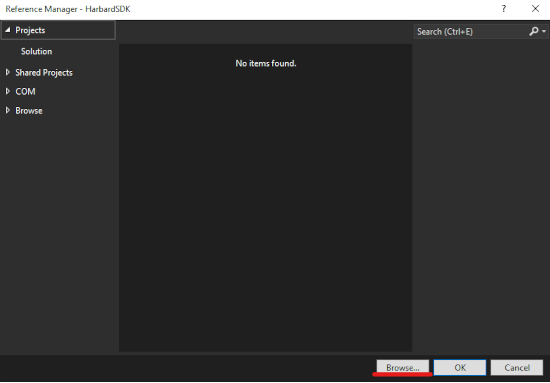
- Find your HarbardSDK.dll file, select it and click
Add
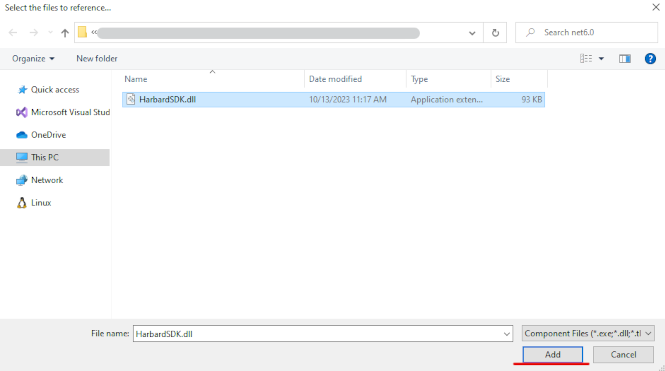
- After the HarbardSDK.dll file has been added to the Reference Manager click on
OK
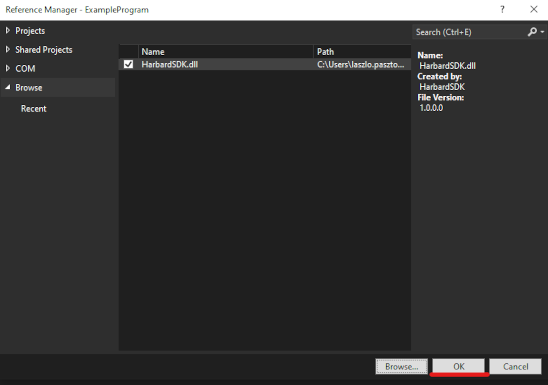
Important
Adding NewtonSoft JSON to a solution is necessary for the HarbardSDK to work!
Follow this quick guide to learn how to add NewtonSoft JSON to your solution:
